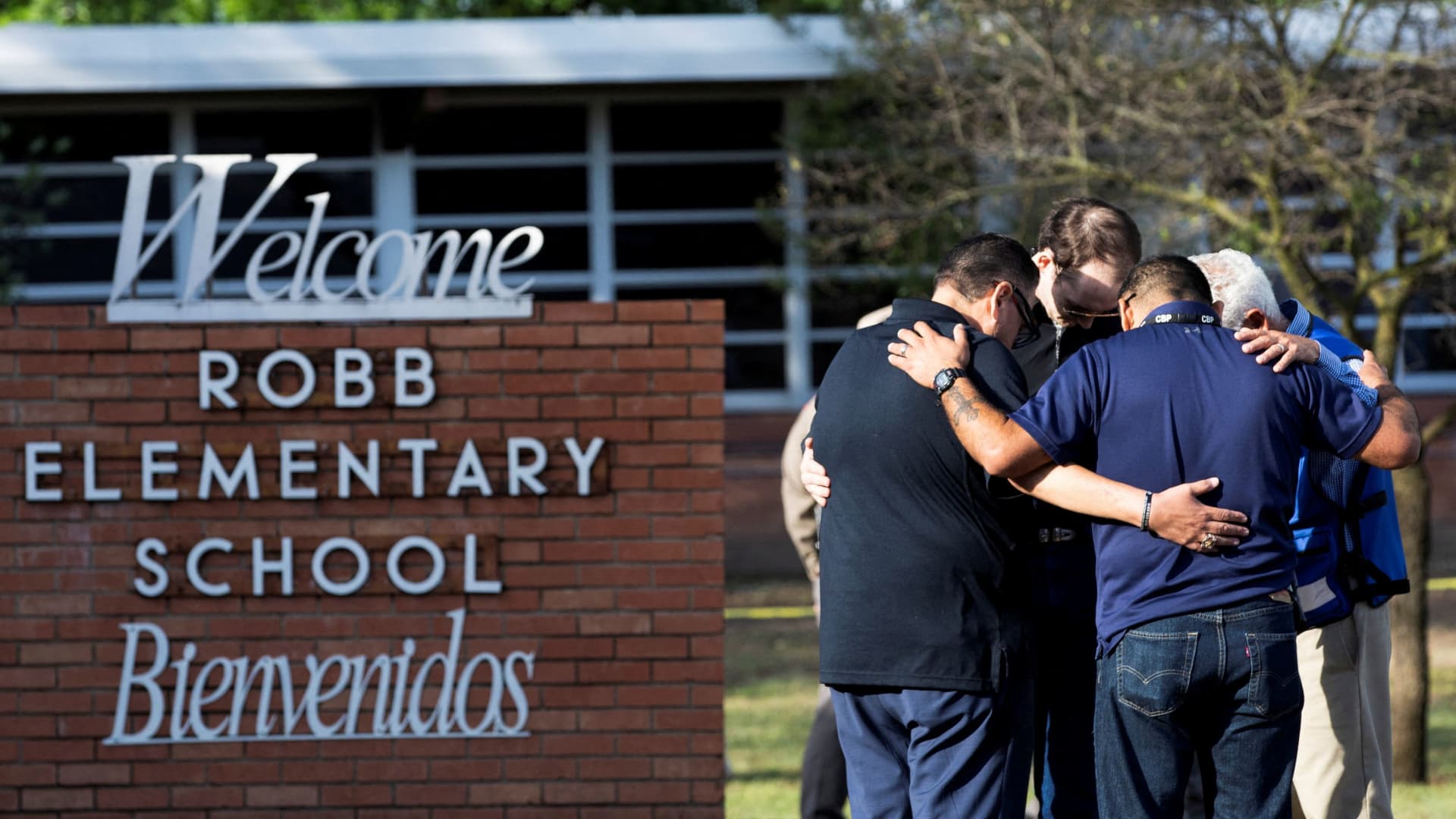
- Senate Majority Leader Chuck Schumer pledged Wednesday renew his attempts to pass stricter U.S. gun-control laws.
- But Schumer acknowledged that Republicans will likely block additional firearm regulation even after Tuesday's mass shooting in Texas left 19 children and two teachers dead.
- Schumer said that the Senate will on Thursday review a gun-control bill that cleared the House earlier in May, days after a separate mass shooting in Buffalo, New York.
Senate Majority Leader Chuck Schumer pledged Wednesday to renew his efforts to pass stricter U.S. gun-control laws, but acknowledged that Republicans will likely block new firearm regulations even after a gunman killed 19 children and two teachers at a Texas elementary school.
Schumer, the chamber's top Democrat, implored his Republican colleagues to resist the influence of the National Rifle Association, a powerful pro-gun lobbying group, and join Democrats to discuss what measures Congress could pass to reduce mass shootings.
"Please, please, please, damn it, put yourself in the shoes of these parents for once," the New York lawmaker said from the Senate floor a day after the teenage gunman killed 21 people in Uvalde, Texas.
Get top local stories in DFW delivered to you every morning. Sign up for NBC DFW's News Headlines newsletter.
"Maybe that thought — putting yourself in the shoes of these parents instead of the arms of the NRA — might let you wriggle free from the vise-like grip of the NRA," Schumer added, "might free you to act on even a simple measure."
Democrats have long blamed the NRA, its millions-strong membership and significant financing, for swaying Republicans against gun policy changes.
As the U.S. shares its collective horror over the mass killing of children, the Senate appears unlikely to pass gun-safety legislation before lawmakers leave for a Memorial Day recess. Schumer noted that many Democrats want him to quickly take up a House-passed background check bill, but conceded that Republicans would likely block the legislation — as they have with similar measures in the past.
Money Report
Representative Steny H. Hoyer of Maryland, the No. 2 House Democrat, said in a Twitter post Wednesday afternoon that he will bring a bill to the chamber floor in the first week of June to create a national "red flag" law.
Such laws allow police or family members to petition a court to order the temporary removal of firearms from a person suspected of posing a danger to themselves or the public.
Schumer, echoing Tuesday comments by Sen. Chris Murphy, D-Conn., disparaged Republicans who argue that the best way to stop mass shootings is to focus more on mental health than the availability of guns.
"Rates of mental illness are more or less the same across the developed world," Schumer said. "The U.S. is not an outlier on mental illness."
"But we are an outlier in the sheer number of guns available in this country," he added. "That is why we have so many shootings and other Western countries don't."
The NRA did not respond to CNBC's request for comment.
The Texas shooting and a string of other gun massacres have reengaged Democrats to pass stricter gun-safety rules. President Joe Biden in an emotional speech Tuesday also called on Republicans to resist the firearms industry's influence to help curb gun violence.
The White House, asked if Biden has made plans to visit Uvalde, declined to offer details. CNN reported that the administration is "in the early stages" of planning a presidential visit to Texas.
At the end of his remarks, Schumer said that the Senate on Thursday will consider a bill that the House passed earlier this month, days after a separate mass shooting in Buffalo, New York, left 10 people dead. The gunman targeted shoppers at a grocery store in a predominantly Black neighborhood.
Schumer called upon his GOP counterpart, Sen. Mitch McConnell, to join Democrats and allow for debate on and amendments to that legislation.
The bill, known as the Domestic Terrorism Prevention Act, would create three new offices in the F.B.I, the Justice Department and the Department of Homeland Security to monitor and investigate domestic terrorism. It would mandate biannual assessments of the threat posed by white supremacists and neo-Nazi ideology in the U.S., which contributed to the Buffalo shooting on May 14.
It's unclear whether McConnell, the minority leader, will agree to Schumer's appeals. In his own brief comments Wednesday, the Kentucky Republican described the killings in Uvalde, Texas, as "sickening."
"The entire nation's hearts are broken for the victims and their families," McConnell said. "Words simply fail."
McConnell did not address policy in his remarks.
Even if McConnell allows discussion on the domestic terrorism bill, Senate Republicans would likely block it. As Schumer also acknowledged, the GOP would likely block a slate of other bills designed to reduce gun violence that Democrats support.
The GOP has for years argued that the key to ending criminal gun violence is greater access to mental health services. They say tougher gun regulations would infringe upon private citizens' right to bear arms.
Sen. Ted Cruz, a Republican from Texas, said on Tuesday that editing guns laws wouldn't prevent "another act of evil and mass murder." He cited the Second Amendment.
"Inevitably when there's a murder of this kind, you see politicians try to politicize it," Cruz said. "You see Democrats and a lot of folks in the media whose immediate solution is to try to restrict the constitutional rights of law-abiding citizens. That doesn't work. It's not effective."

Congress could also choose to take up bipartisan legislation penned by Democratic Sen. Joe Manchin of West Virginia and GOP Sen. Pat Toomey of Pennsylvania in the aftermath of the 2012 school massacre at Sandy Hook Elementary in Connecticut.
Several Democratic senators, and at least one Republican, signaled a renewed appetite for conversations about new gun regulations on Wednesday.
Sen. Mark Kelly, an Arizona Democrat up for reelection in November, wrote on Twitter that "there are commonsense reforms we can pass to reduce gun violence that align with our rights and are supported across the political spectrum."
Sen. Susan Collins, R-Maine, reportedly said that she heard from Murphy's office and that she's open to discussing a so-called red flag law.
But even the bipartisan Machin-Toomey bill, which would introduce universal background checks on gun purchasers and quash loopholes for firearms purchased at gun shows and over the internet, has languished in the Senate for the past decade.
The Senate voted 54-46 in favor of the Manchin-Toomey bill in 2013, but it has yet to overcome the 60-vote requirement to clear the chamber's filibuster rule.
Schumer acknowledged that political reality Wednesday morning, when he suggested he wouldn't hold a vote on a bill that lacks enough support to clear the Senate.
"This isn't a case of the American people not knowing where their senators stand," he said. "They know."






